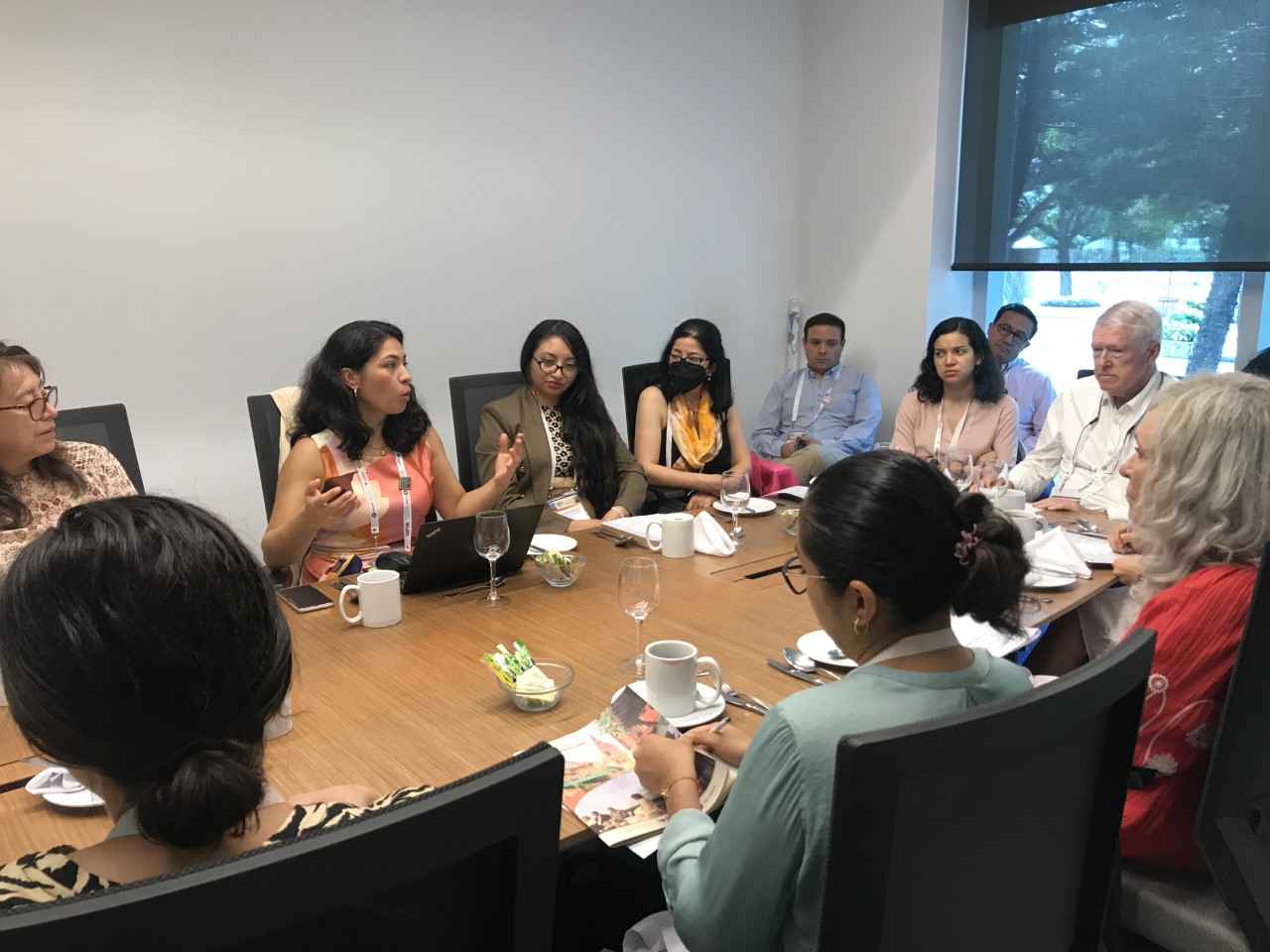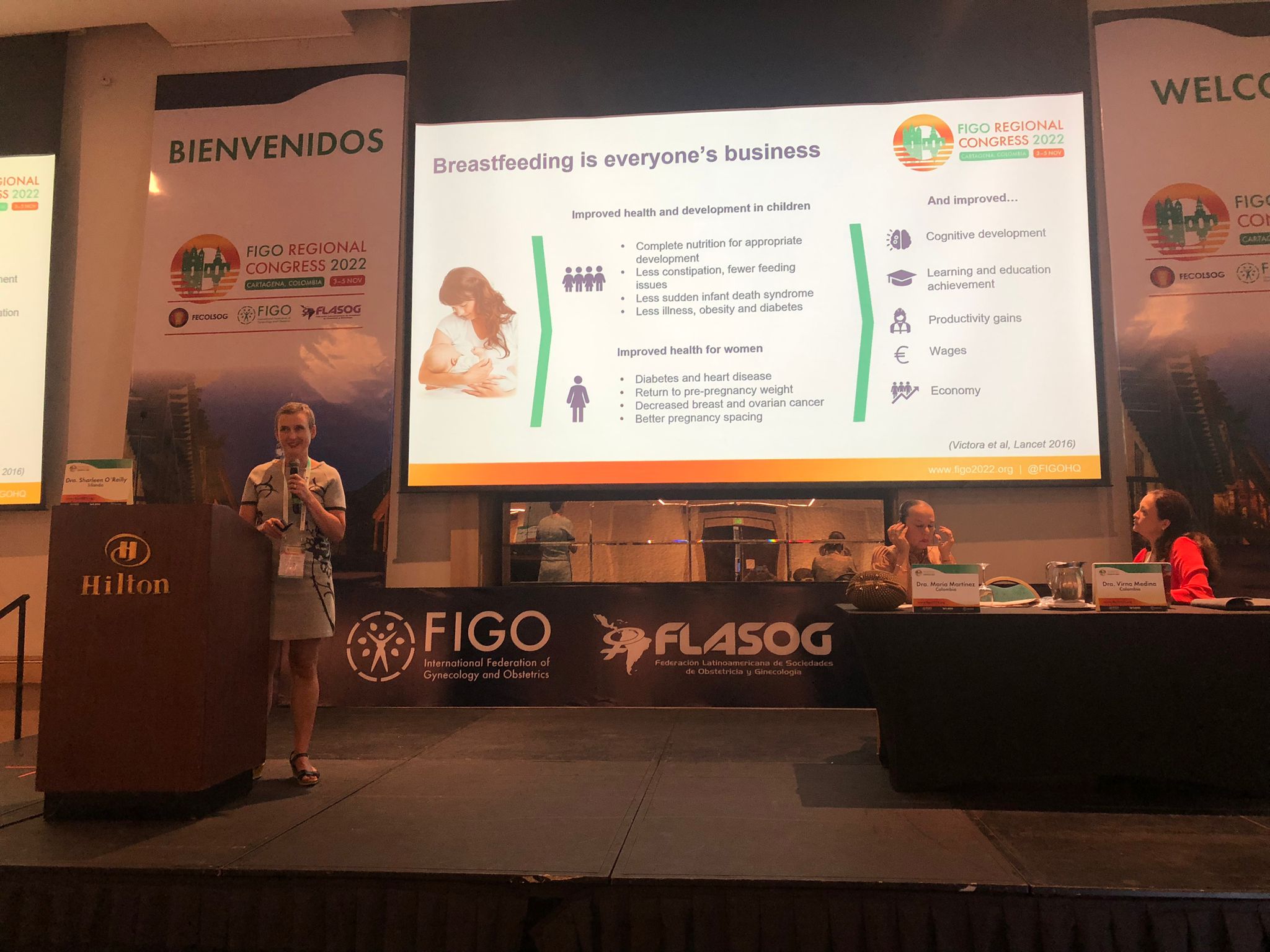FIGO Regional Congress – Cartagena 2022: Day two round-up
On 3–5 November, FIGO leaders from around the world welcomed hundreds of clinicians and decision-makers in women's health and rights to Cartagena, Colombia, for the FIGO Latin America Regional Congress.
Day two of the Regional Congress gave delegates the opportunity to learn more on the topics of respectful care in childbirth and safe abortion, subfertility, and high-risk pregnancy management in LMICs. Here, we share some of the highlights from the key sessions.
Breakfast session: Respectful care in childbirth and safe abortion
In a breakfast session hosted by the FIGO Committee on Health Systems Strengthening and Respectful Care, attendees discussed respectful care in both childbirth and safe abortion.
Dr Suellen Miller gave an overview of the work carried out by the International Childbirth Initiative (ICI) in hospitals around the globe, describing ICI’s 12 Steps to safe and respectful maternity care. Dr Miller underlined the importance of focused, timely, effective and respectful care that can be implemented by facilities, centres, hospitals and units providing respectful care before, during and after birth to women and newborns.
Dr Laura Gil then gave a presentation on respectful care in the provision of abortion services. She highlighted that:
“The problem with disrespect in abortion care is that women who seek abortions digress from social norms that consider that they should be mothers. As a result, they receive judgement from medical professionals, and it is considered normal for them to be disrespected when seeking an abortion. Many women end up judging themselves too, due to the strong social stigma surrounding abortion, and this leads to the normalisation of abusive practices and disrespect in abortion care.”
– Dr Laura Gil
Dr Gil underlined that there are five key issues that need to be looked at to improve the quality of care in abortion services: respect for women’s autonomy; moving away from the excessive medicalisation and pathologisation of abortion; favouring evidence-based approaches and counselling; compassion in care; and judgement-free post-abortion care.

Workshop: Subfertility: how to go about it
Organised by FIGO’s Committee on Reproductive Medicine, Endocrinology and Infertility, this workshop gave a comprehensive overview of how to approach subfertility. The workshop aimed to improve attendees’ knowledge of an often-misunderstood challenge that affects significant portions of the global population.
Talks focused on the sub-fertile male and the fertile female, and explored the roles of endocrine evaluation, trans-vaginal scan and endoscopy in subfertility. In addition, the workshop also discussed ovulation induction, the prevention of ovarian hyperstimulation syndrome (OHSS), and IDEA, compared surgical and medical managements of subfertility and looked at the differences between IUI and ART. The session ended with a presentation on options for patients with poor responses to interventions for subfertility.
Keynote lecture: Novel solutions to high risk pregnancy management in LMICs
Organised by the FIGO Committee on Well Woman Health Care, this session outlined the important role technology can play throughout the maternal journey. Dr Divakar began by exploring the various challenges faced by healthcare professionals in rural settings. Dr Divakar went on to highlight the role played by technology throughout the COVID era, and the extent to which the need to adapt encouraged women and health care professionals alike to embrace new technologies, and that this openness has continued.
An example from India was then shared, where the focus has been placed on local centres, staffed with heath care providers that speak the local language and have been provided with training on point of care devices. Telemedicine is then relied upon to gain more technical medical input. Dr Divakar concluded by highlighting the ‘Your health is in your hands’ pilot project.
Breakout session: Infections and their prevention during pregnancy: today and tomorrow
Dr Santiago Garcia Rodriguez writes:
FIGO's strategy to prevent infectious diseases in pregnancy focuses on ensuring that the world's women achieve the highest possible standards of physical, mental, reproductive and sexual health and wellbeing throughout their lives.
The session focused on barriers to implementation including concern over vaccine safety, cost, accessibility, and limited knowledge or training. The session recommended that all pregnant women receive tetanus, diptheria and pertussis vaccinations, as well as inactivated influenza.
Sustainable vaccination programmes for pregnant women should be implemented, focused on issues specific to vaccines, immunology and WHO guidance, alongside women's rights, and implementation in low- and middle-income countries.
To overcome these barriers, it is necessary to include pregnant women in vaccine trials, and improve human papillomavirus vaccination coverage.
The prevention of maternal morbidity and mortality begins with vaccination, in addition to the benefit for foetal health by preventing low weight and growth restriction, preterm birth and foetal death.
There are also benefits for the newborn, the transplacental passage of antibodies that protects them during the first six months of life, which is their most vulnerable time.
Breakout session: Institutional violence, a truth that makes you uncomfortable
This breakout session organised by the Committee on Women Facing Crisis: Human Rights, Refugees and Violence Against Women touched on the lack of training and understanding on how to handle women facing violence within health care services as clinicians as do not consider it their responsibility presently.
FIGO's President, Dr Jeanne Conry, gave a special address emphasising how women can face many situations of violence in their lives, from discrimination to domestic violence, and how it is the physicians’ role to protect and advocate for women.
"As physicians, it is our role to acknowledge and support women when they have conditions such as diabetes. However, violence against women is much more frequent, so why can we talk about one as physicians but not the other. The causes of violence need to be addressed, and we have to advocate for all rights as women with patients, governments, and clinicians.”
– Dr Jeanne Conry
Dr Miguel Guiterrez’s presentation focused on Latin America, and the region’s efforts. He mentioned that as of today, Peru is the only country with a national protocol to tackle the issue violence against women within sexual and reproductive health services in Latin America. He went on to highlight the gap in education on the topic. The session further featured trainees’ perspectives through contributions by Dr Atziri Ramirez and Dr Diana Galimberti, which emphasised the lack of dialogue and education and how it should be part of their curriculum. The panel reached the consensus that training and political advocacy were fundamental and needed to be pushed to address this overwhelmingly widespread issue.
Workshop: Teach the Breech
From WATOG’s board of directors, Dr Goknur Topcu and Dr Francisco Ruiloba led their renowned Teach the Breech course. Directed by Professor Frank Louwen, they presented clinical evidence dismissing myths about breech delivery, and discussed whether pelvic presentation is a pathological state or whether it is a variation of normalcy.
The session included a hands-on workshop, exemplifying pelvic presentation delivery with simulators. Teach the Breech was previously held virtually at the FIGO World Congress in 2021.
Breakout session: nutrition and obesity across the life course
With participation from Dr Nikhil Purandare, Dr Sharleen O’Reilly, Dr Virna Medina and Dr Sarah Louise Killen, this breakout session organised by the Committee on the Impact of Pregnancy on Long-term Health outlined the importance of nutrition and weight management in women’s health.
The main conclusions included how a reduction in weight results in better fertility outcomes in both men and women, and optimisation of BMI prior to fertility treatment and subsequent pregnancy reduces maternal morbidity and related neonatal complications.
Breastfeeding was also identified as playing a key role in the improvement of health and development for both mother and child in terms of obesity, diabetes and decreased risks of breast and ovarian cancer in the mother. Discrimination in obese patients was prominently discussed with speakers stating that obese patients can be refused fertility treatments and how women living with obesity and gestational diabetes often receive less support to initiate breastfeeding.
The session concluded with an overview of the impacts of undernourishment and malnutrition in Latin America and an update on the Committee’s project – the FIGO Nutrition Checklist – through which it aims to provide optimum nutrition for pregnancy, taking into account food intake, micronutrients, different diets and BM. It also provides advice upon completion that women can discuss with their health care professionals.

Keynote lecture: Surgical management of pelvic organ prolapse
Organised by FIGO’s Committee on Urogynaecology and Pelvic Floor Disorders, this keynote lecture by Dr Jorge Milhem Hadad explored the effectiveness of different surgical approaches to managing pelvic organ prolapse.
Its key conclusions highlighted that in the case of anterior prolapse, site specific repair is preferred and the patient’s native tissue should be used. In the case of apical prolapse, individualising care is key to indicate the best surgery for the patient’s particular needs and situation. In some cases, colpocleisis can be a great alternative, particularly for elderly patients. In posterior prolapse, Dr Milhem Hadad explained that the use of mesh does not optimise surgical results and consequently, native tissue repair is a preferable approach.
Keynote lecture: Minimal Access Surgery: facilitating treatment of endometriosis
This session, organised by the FIGO Committee on Minimal Access Surgery, focused on the utilisation of minimal success surgery to facilitate the treatment of endometriosis. Dr Megan Wasson began by exploring the impact of endometriosis, explaining that 10% of women are affected and highlighting the difficulties they face in receiving a diagnosis.
Dr Wasson went on to explore the advantages of a minimal access approach, namely enhanced visualisation, increased precision, improved access and faster recovery. Various patient case studies were presented, illustrating the real-life application and advantages of the technique.
Keynote lecture: Present and future of cervical cancer treatment in developing countries
Dr Leopoldo Santiago Sanabria, Residente de Ginecología y Obstetricia at Hospital Ángeles Lomas, writes:
Dr Buitrago and Dr Pareja made us reflect on the current situation in Latin America, where there are large gaps in access to cancer treatment and palliative care. Unfortunately, it continues to be a major cause of morbidity and mortality in our countries. We do not have sufficient resources to face this reality. Despite this, there are strategies for its control and elimination in the future. For this, it is essential to have greater coverage of vaccines and quality screening. There is an invitation to join efforts to fight against this pathology that is preventable.
Helping to move Latin America closer to achieving its scientific, health care and sustainable development goals, the FIGO Regional Congress was hosted in collaboration with the Federación Colombiana de Obstetricia y Ginecología (FECOLSOG) and the Federación Latinoamericana de Sociedades de Obstetricia y Ginecología (FLASOG).